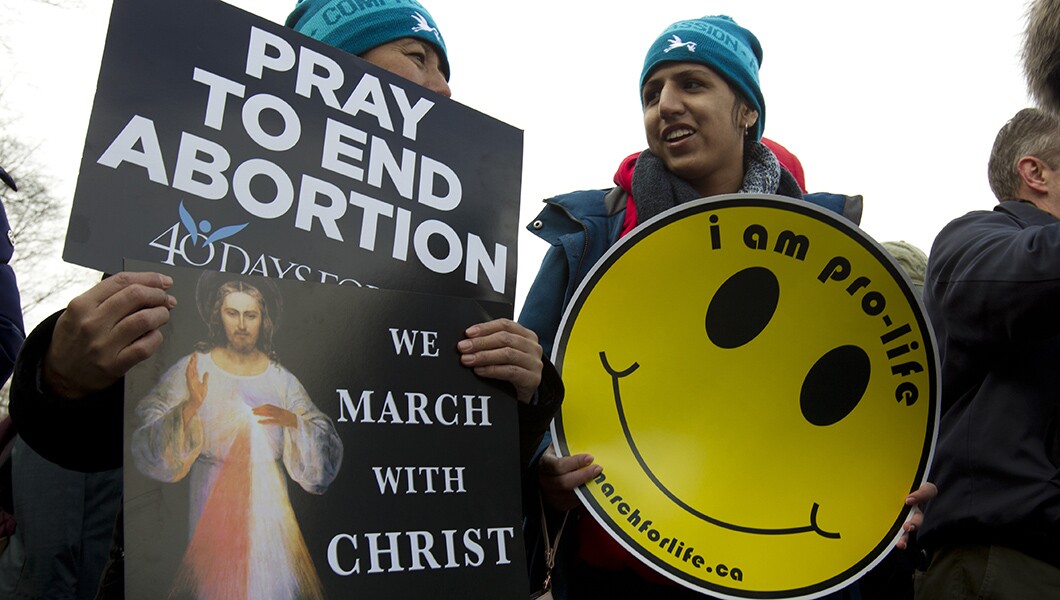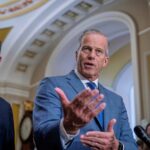
Catholic activists say the Supreme Court should take up the issue of fetal personhood in light of the overturning of
Roe v. Wade
this summer in an attempt to establish prenatal rights nationwide.
In a 46-page petition filed Tuesday asking the justices to review its case, the group Catholics for Life says the Supreme Court has yet to “clarify whether an unborn human being has standing to access the courts” following its legal loss in several Rhode Island courts dating back to 2019.
The religious group represents Nichole Leigh Rowley and two unborn children recognized in court filings as “Baby Mary Doe” and “Baby Roe,” claiming that their loss before the state Supreme Court in May should be reconsidered because the recent standing denial was “deeply rooted in Roe.”
SOUTH CAROLINA SENATE FAILS TO PASS TOTAL ABORTION BAN AS GOP WOMEN OBJECT

Anti-abortion activists march toward the Supreme Court, during the March for Life in Washington.
(AP Photo/Jose Luis Magana)
The high court’s June 24 opinion in
Dobbs v. Jackson Women’s Health Organization
, which allowed states to create laws severely limiting or restricting abortion access, was the case that struck down almost five decades of guaranteed nationwide abortion access based on the 1973 precedent over Roe.
In order for the Supreme Court to weigh in on the matter, four or more justices have to give their approval toward hearing the case. The high court typically receives thousands of petitions each year and usually grants around 80 requests.
“This case presents the unavoidable confrontation of Dobbs,” the petition reads, “which left unresolved the tensions between the Tenth Amendment, federalism, and any surviving constitutional guarantees for the unborn.”
Rhode Island passed the Reproductive Privacy Act in 2019 that codified the right to abortion under the Roe standards, thus repealing other statutes that placed limits on abortion.
The petitioners lost their request for an injunction in lower court battles and later amended their complaint to challenge the state legislature’s authority to implement the abortion protections measure. They also sought to obtain a declaration of their rights they claim were lost when the RPA took effect. The state filed for and received a dismissal. Petitioners have repeatedly lost appeals in their attempt to ascend to higher courts.
“Viewing the allegations in their pleadings in the light most favorable to the adult plaintiffs, we are of the opinion that they lack standing to bring this action under any conceivable set of facts,” the state Supreme Court wrote in its ruling in May. “[T]he unborn plaintiffs fail to assert a legally cognizable and protected interest as persons pursuant to these repealed statutes, which are contrary to the United States Constitution as construed by the United States Supreme Court.”
Republican-appointed Supreme Court Justices Samuel Alito (the author of the Dobbs opinion) and Brett Kavanaugh both signaled in the June 24 ruling that further matters related to prenatal life would remain as questions to resolve at the state level.
CLICK HERE TO READ MORE FROM THE WASHINGTON EXAMINER
“The Court will no longer decide how to evaluate the interests of the pregnant woman and the interests in protecting fetal life throughout pregnancy,” Kavanaugh wrote in a concurring opinion. “Instead, those difficult moral and policy questions will be decided, as the Constitution dictates, by the people and their elected representatives through the constitutional processes of democratic self-government.”
Since the Dobbs opinion, 14 states now have near-total bans on abortion, and as many as 13 additional states are considering laws to restrict access.







